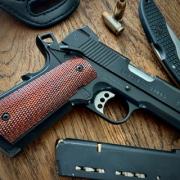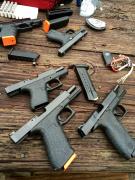Members of the shooting community often reference law enforcement firearms proficiency standards as useful measures of competency. They will measure themselves against these standards, use them as benchmarks, or adapt the courses of fire for their own uses.
As part of other efforts, I have been collecting the handgun qualification courses of fire established by state regulatory bodies governing police service (POST boards, etc). These courses of fire represent that states academy exit standard for handgun proficiency, annual (or more frequent) continuing education or proficiency requirement for the handgun, other applicable handgun qualification standard established for serving as a law enforcement officer in that state, or a state LEOSA standard.
The links below are those courses of fire, listed alphabetically by state. To ensure accuracy, only those courses of fire published by the POST body, to their own website, are included here. Where the course is part of a larger document or manual, page numbers are referenced.
As you utilize this resource, keep in mind that these constitute a minimum standard of proficiency. Alternate courses may be approved in lieu of these courses, and local agencies may utilize higher standards in their programs.
....
Alabama Police Officers Standards and Training Commission
http://www.apostc.state.al.us/Portal...%203-29-07.pdf
Alaska Police Standards Council
Not found on site
Arizona Peace Officers Standards and Training
Semi-auto:
http://www.azpost.state.az.us/assets...defintions.pdf
Revolver:
http://www.azpost.state.az.us/assets...lverCourse.pdf
Arkansas Law Enforcement Training Academy
http://www.clest.org/aleta/Documents/handgun.pdf
California Commission on Peace Officer Standards and Training
Not found on site
Colorado Peace Officer Standards and Training Board
http://www.coloradoattorneygeneral.g...N%20COURSE.pdf
Connecticut Police Officer Standards and Training Council
Not found on site
Delaware Council on Police Training
Not found on site
Florida Criminal Justice Standards and Training Commission
http://www.fdle.state.fl.us/Content/...DTD110807.aspx
Georgia Police Officers Standards and Training Council
http://www.gapost.org/pdf_file/gsac05.pdf
Hawaii
Not found on site
Idaho Peace Officers Standards and Training
http://www.post.idaho.gov/Forms/docu...msQualForm.pdf
Illinois Law Enforcement Standards and Training Board
http://www.ptb.state.il.us/pdf/AdmRu...alFirearms.pdf
http://www.isp.state.il.us/foid/hr218secondarycw.cfm Secondary/Covert Weapon Course of Fire, 2006 (LEOSA Qual)
Indiana Law Enforcement Training Board
http://www.in.gov/ilea/files/48_round_course.pdf
http://www.in.gov/ilea/files/60_round_course.pdf (IN LE Academy Instructor Handgun Course)
Iowa Law Enforcement Academy
Not found on site
Kansas Commission on Peace Officers Standards and Training
http://www.kscpost.org/target.php
http://www.kletc.org/pdf/resources_h...se_of_fire.pdf
Kentucky Department of Criminal Justice Training
Not found on site
Louisiana Commission on Law Enforcement Administration of Criminal Justice
http://www.lcle.la.gov/programs/uplo...emy_Manual.pdf
(Page 59)
Maine Criminal Justice Academy
http://www.maine.gov/dps/mcja/forms/...Course2011.doc
Maryland Police and Correctional Training Commissions
Not found on site
Massachusetts Municipal Police Training Committee
http://www.mlefiaa.org/files/LEO_002...lification.pdf
Michigan Commission on Law Enforcement Standards
http://www.michigan.gov/documents/mc...d_249947_7.pdf
(Page 20)
Minnesota Board of Peace Officer Standards and Training
https://dps.mn.gov/entity/post/forms...structions.pdf
Mississippi Board on Law Enforcement Officer Standards and Training
Not found on site
Missouri Peace Officer Standards and Training
Not found on site
Montana Peace Officers Standards and Training Council
Not found on site
Nebraska Law Enforcement Training Center
http://www.nletc.state.ne.us/pdfs/FireQual.pdf
Nevada Commission on Peace Officers’ Standards and Training
Not found on site
New Hampshire Police Standards and Training Council
Not found on site
New Jersey Police Training Commission
http://www.state.nj.us/lps/dcj/njptc...armsManual.pdf (Page 23)
http://www.state.nj.us/lps/dcj/pdfs/dcj-firearms.pdf
New Mexico Department of Public Safety Law Enforcement Academy
http://nmlea.dps.state.nm.us/documen...ence_Guide.pdf
(Page 88)
New York State Division of Criminal Justice Services
Not found on site
North Carolina Criminal Justice Education and Training Standards Commission
http://ncja.ncdoj.gov/getdoc/fe3d19f...--Rev--XI.aspx
(Page 50)
North Dakota Peace Officer Standards and Training Board
Not found on site
Ohio Peace Officer Training Commission
http://www.ohioattorneygeneral.gov/F...e-of-Fire.aspx
Oklahoma Council on Law Enforcement Education and Training
http://www.ok.gov/cleet/documents/Fi...onJune2007.pdf
Oregon Department of Public Safety Standards and Training
Not found on site
Pennsylvania Municipal Police Officers’ Education and Training Commission
Not found on site
Rhode Island Police Officers Commission on Standards and Training
Not found on site
South Carolina Law Enforcement Training Council
Not found on site
South Dakota Law Enforcement Standards and Training Commission
https://atg.sd.gov/docs/State%20Hand...NOV%202013.pdf
Tennessee Peace Officer Standards and Training Commission
Not found on site
Texas Commission on Law Enforcement Officer Standards and Education
Not found on site
Utah Peace Officer Standards and Training
Not found on site
Vermont Criminal Justice Training Council
Not found on site
Virginia Department of Criminal Justice Services
http://www.dcjs.virginia.gov/standar...aining/cjm.pdf
(Pages 508-515)
Washington State Criminal Justice Training Commission
Not found on site
West Virginia Division of Justice and Community Services – LEPS
Not found on site
Wisconsin Department of Justice Training and Standards Bureau
https://wilenet.org/html/leosa/wis-course-approved.pdf
Wyoming Peace Officer Standards and Training Commission
Not found on site




 Reply With Quote
Reply With Quote




